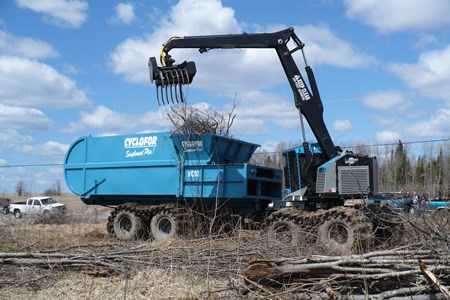Kirkland Lake officials are looking to bioproducts to breathe new life into their local economy.
With areas such as Opasatika seeing some success in the quantity of locally available forest slash for commercial bioenergy, Kirkland Lake may also benefit from a similar analysis, says Wilfred Hass, the city’s director of economic development and tourism.
“While we’re hopeful, I don’t believe you should just build something because maybe you can build it,” says Hass.
“There should be a business case for it, and whoever comes to invest in that can see a business case and can make realistic judgments on that. That’s one of the things we’ll be looking at.”
City council recently lent its support to the idea of creating a power plant using biomass through heat, electricity or biofuels.
Funding for the study is being sought with a $100,000 application from the provincial government. Any funds received through the Northern Ontario Heritage Fund Corporation would be met by a 25 per cent investment from the city.
A request for proposals is expected to be issued in the coming weeks, with officials hoping to have the actual study wrapped up by early spring 2009.
Talks with other communities pursuing similar interests will also be held to understand budgeting expectations.
The private sector has already shown an interest in biofuel-related projects within the city.
It has sparked much of the drive behind the current study proposal. Various unnamed companies, both local and external, have approached the city to determine its plausibility, however, there was no thorough feasibility study undertaken.
Hass says the study will determine whether the amount of regional waste wood and forest slash could prove to be sufficient for different kinds of projects. A raft of other factors such as staffing requirements, environmental assessment considerations, and potential costs will also be examined in the study.
What’s more, Kirkland Power has a co-generation plant in the area, and any work undertaken by the city must not overlap, as they also make use of waste wood, Hass says.
Some companies have already been identified, such as tree nurseries, as key participants in the project.
Others include Rosko Forestry Operations’ new mill, which may act as a source of wood waste or even be an end-user for any energy produced.
Despite the relatively recent nature of the study, Hass says there has already been a great deal of misunderstanding surrounding the project, and insists that despite watercooler whispers to the contrary, nothing is set in stone.
No solid goals have been established, and no ideas have been settled. At the moment, all that’s been decided is the study itself.
“It’s certainly taken a life of its own in some circles, and somebody put out a rumour we’re doing an ethanol plant,” says Hass with a laugh. “We don’t have any farmlands around here, so we’re not doing ethanol, but we want to know what other bioproducts can be used here.”




